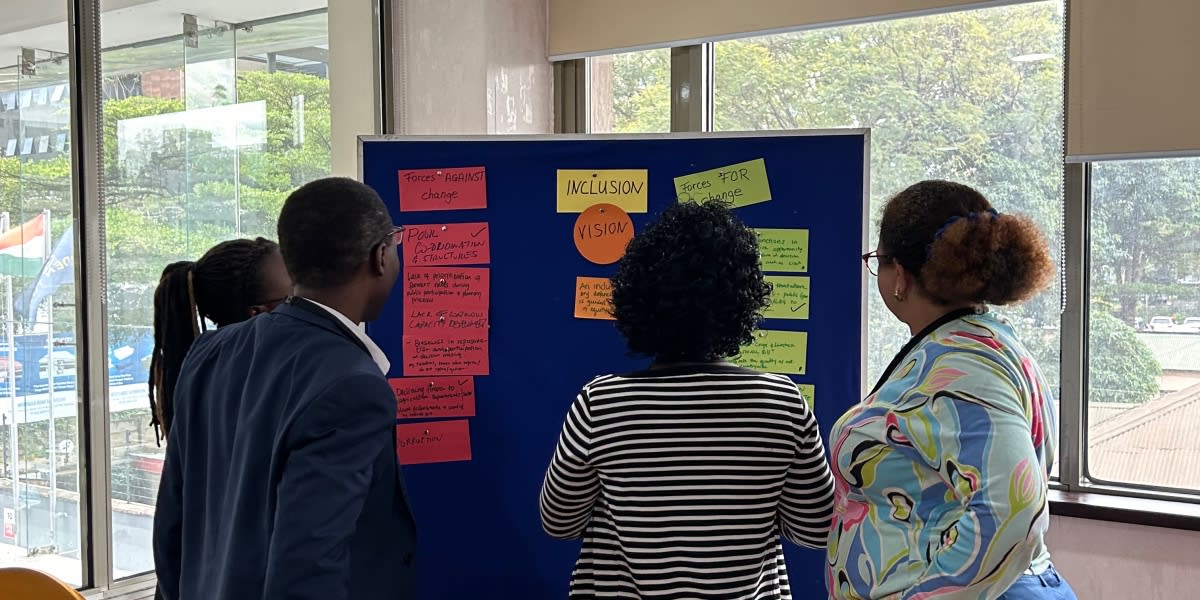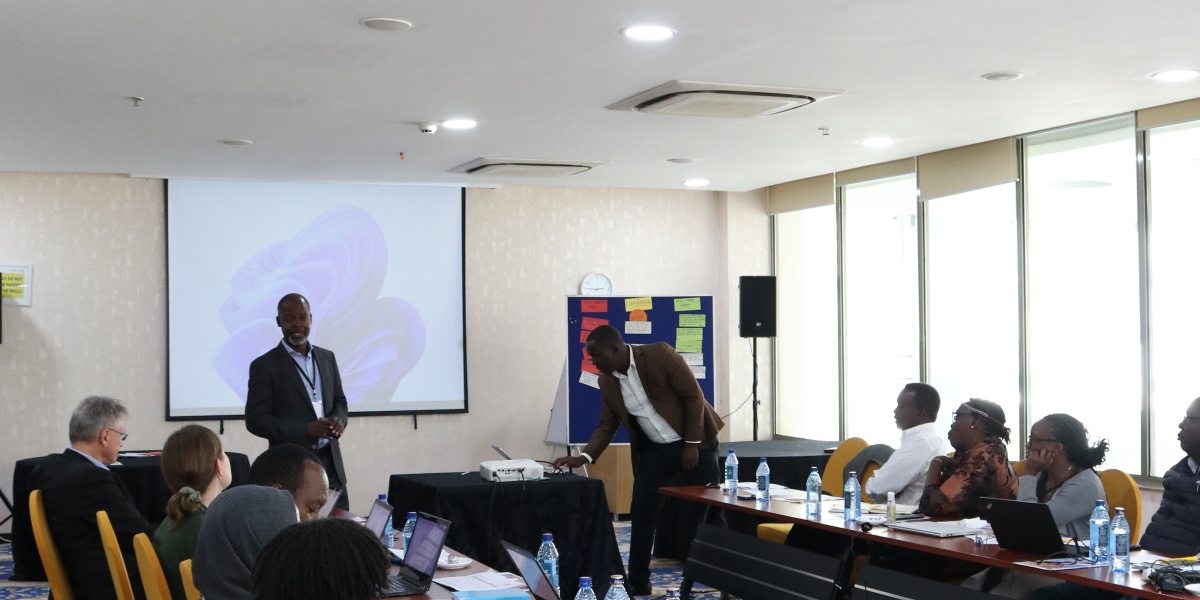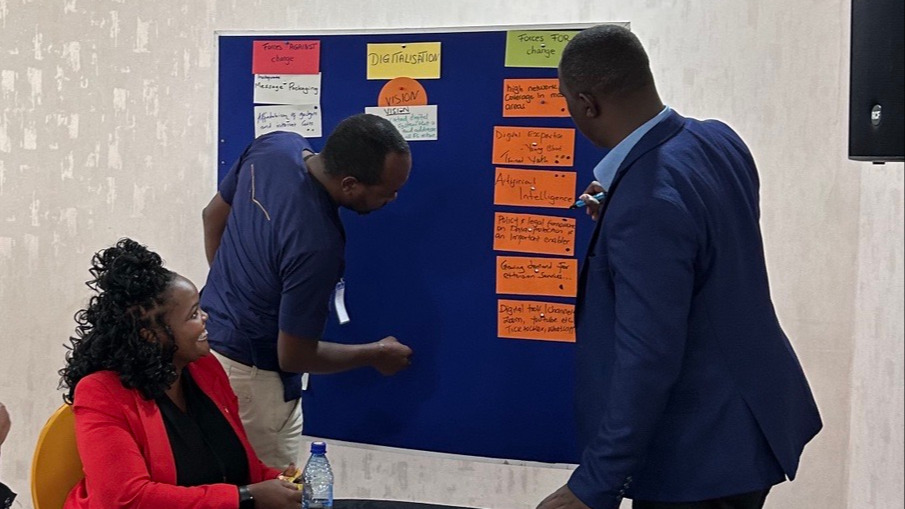Exploring pathways for governing food systems transformation (FST) in Kenya
TMG Research organized a workshop in Nairobi with diverse actors from government, civil society, private sector, and research to jointly explore governance mechanisms for the transformation of Kenya’s food systems.
by Emmanuel Atamba | 2024-07-08

Transformation in food systems is an inherently complex endeavour, requiring a systemic approach to address the myriad challenges faced by agri-food systems. This involves ensuring the participation of diverse actors, including marginalized groups, and addressing interconnected issues such as land use, nature conservation, and human development. However, efforts to transform food systems globally, as well as at national and sub-national levels, often lack coherence and well-defined governance mechanisms. The absence of robust governance frameworks not only hampers the achievement of desired outcomes but also heightens the risk of exacerbating inequalities by excluding key stakeholders from decision-making processes and interventions.
Unpacking the complexities of food systems transformation governance
As part of its governance of food systems transformation project, since January 2022, TMG has organized a series of dialogues, including experts from Kenya. Through this approach, TMG has been analyzing the governance of the food systems transformation landscape in Kenya, gathering insights on potential entry points as well as assessing examples of viable approaches to strengthen FST governance in Kenya. While the previous workshops were mainly shaped as a political dialogue between different African and Asian countries, focusing on the governance of FST, there was a need to explore more targeted approaches to unpack deep-seated governance issues in a more detailed manner. Therefore, TMG organized a workshop in Nairobi with diverse actors from government, civil society, private sector, and research to jointly explore governance mechanisms for the transformation of Kenya’s food systems. The workshop offered a format which used the specific case of extension service delivery to identify concrete entry points to steer FST and tried - in a second step – to reflect these issues from a broader FST governance perspective.
The analytical lens of extension service systems provided an intriguing starting point for a joint analysis. As a pars pro toto case, extension service systems encapsulate the complexity of pluralism with different formats of public, private and donor-driven services existing in Kenya, accountability mechanisms in service delivery, and an opportunity to reflect on systemic marginalization. Discussions were held through both plenary and group discussions focusing on four elements of governance: coordination, digitalization, financing, inclusion and accountability.
What do we learn from the case of extension services delivery in Kenya?
Reflection on extension services provided an opportunity to reflect on how far Kenya’s politics to steer, finance and improve agriculture and food systems development have come. Inputs from participants with decades of experience in extension service provision reflected on the past. From the 1954 Swynnerton Plan and publicly financed approaches to extension services heavily funded by development partners such as the World Bank and the Swedish International Development Cooperation Agency (SIDA), over through devolution, and finally to the current state exploring digitalized, private sector-led, demand-driven extension services. What governance lessons can be drawn?
Effective coordination was identified as a crucial element in the delivery of extension services. Weak intergovernmental coordination between the national and county levels of government, as well as coordination across actor groups - civil society/NGOs, government and the private sector - was blamed for incoherence in service delivery, inadequate knowledge management and exchange, duplication and contradiction of efforts.
Financing of extension services was also identified as a key driver. Discussions on sustainable financing also show that it goes beyond having a relevant budget line to include exploring efficient mechanisms and models of cooperation to ensure optimum resource use and value generation to make extension service delivery sustainable.
The role of private sector investments to implement extension service approaches based on key service delivery and produce marketing was heavily discussed. While this role will continue to grow and offer a stronger, more sustainable, and quality-oriented approach to extension, its costs to producers and inadequate focus on broader knowledge needs in agroecosystem health, for example, needs to be addressed. As majority of small holder farmers are unable to produce at highly commercial scales, this approach needs to be supplemented public extension to address the sustainability aspects of production while ensuring inclusion of subsistence, small holder producers or communities in under-developed areas who do not have the benefit of attracting the interest of private sector players.
In discussing integration of technology in extension service delivery, the participants proposed to take a deep dive into digitalization as a driver for the future. While it was agreed that Kenya has an advanced digital infrastructure (including internet coverage, developed digital extension tools and expertise), there is a sizable proportion of the population that is not yet ready for take-off. This implies that discussions about digitalization of extension services must consider the potential risk of further marginalizing households and communities that have no access to digital tools. A bridged transition was proposed where digital tools are used by those with capacity, but a human interface should be incorporated to ensure that those without access can obtain the same information available through interaction with extension officers.

Reflections on the governance of FST in Kenya
From extension service delivery, the dialogue bridged to the governance of FST in Kenya. The elements of coordination, inclusion and accountability, financing and digitalization were further discussed, this time reflecting in the broader governance of food systems transformation. Based on the discussions on extension service delivery and further reflections on broader governance of FST, a recognizable pattern emerges. The immense opportunities and glaring challenges in devolution, roles and responsibilities of different actors, access to key food systems services, sustainable financing, systemic marginalization, among others, emerge as challenges that are also relevant within the broader governance of FST discourse.
To reflect on coordination, there exist various mechanisms in place to ensure better coordination between national and county governments and the clarion call was to strengthen these mechanisms. CASSCOM (County Agriculture Sector Steering Committee) is a key structure at county level that could ensure better coordination of actors, including private sector, government, NGOs and CSOs implementing in the different counties. The assessment was that only a few counties have developed legal frameworks to institutionalize it and therefore, ensure it has the mandate and frameworks to operate. Between the national level and county level interaction, JASSCOM (Joint Agriculture Sector Steering Committee) has been established. Despite JASSCOM’s existence, coordination between national and county levels remains weak. There were also proposals to strengthen national level coordination through further strengthening of the Agriculture Transformation Office as well as the establishment of a directorate for collaboration and partnership within the Ministry of Agriculture.
On meaningful inclusion of all actors, the representation of vulnerable, marginalized groups in the coordination and multi-stakeholder structures right from the county to national levels also needs to be mainstreamed to ensure that the voices of the most vulnerable are considered. This calls for a stronger, better coordinated civil society network that speaks for the most vulnerable. The structures and design of multi-stakeholder platforms need to consider that power dynamics are always at play. It is not enough to sit at the table, but actors need strong mechanisms to back their participation in important food systems conversations.
Accountability was also a crucial theme of the discussion. The need to clarify the broad goals of food systems transformation among stakeholders from different sectors, then translate them into sector-specific targets and non-conflicting strategies and policies aligned with the food systems agenda was expressed to strengthen elusive accountability.

Participants discussing in groups at the workshop.
Use of insights
The workshop was organized just before the Partner for Change (P4C) conference in Nairobi, which brought together over 150 participants from 20 countries convened by BMZ. P4C is a sectoral dialogue format, supported by the BMZ, to learn and benefit from knowledge exchange how to better accelerate food systems transformation in the different countries. The core of the conference was a series of eight workshops with one dedicated to the governance of food systems transformation. The insights generated through the workshop organized by TMG were strongly featured in the conference, including the crucial output of the conference which was the post-Malabo declaration memorandum for the AU.
While the workshop format was effective, we note that zooming in on a specific case and zooming out again to broader aspects of FST governance is not as easy as it sounds. There is a need to continuously test different innovative methodologies and dialogue formats to make this process even more seamless. As we continued with our workshop, Kenyan youth (led by the Generation Z or simply referred to as Gen Z) were warming up to what ended up being one of the most serious anti-government protests ever seen in Kenya that would later explode during the week of the P4C. These events were a stark reminder on the role of functionality of state as a pre-condition for positive transformation. Discussions on governance of food systems transformation must consider the overall governance situation especially in rapidly changing demographic and political contexts.
 Urban Food FuturesFeb 09, 2026
Urban Food FuturesFeb 09, 2026Pushing the horizon: Urban farming and community-led innovation in Mukuru informal settlement
A small community-run greenhouse in Mukuru is offering insights into how controlled-environment agriculture can strengthen food security in urban environments under increasing pressure—and a look into the future of food systems in informal settlements.
Christian Sonntag, Emmanuel Atamba, Lumi Youm
 Land GovernanceDec 18, 2025
Land GovernanceDec 18, 2025Land tenure, women’s land rights, and resilience: Reflections from CRIC23 toward UNCCD COP17
Our experts discuss what the exchanges at CRIC23 highlighted and revealed about the role of secure and gender-equitable land tenure in the UNCCD's work ahead of the 2026 triple COP year.
Frederike Klümper, Washe Kazungu
 Urban Food FuturesDec 09, 2025
Urban Food FuturesDec 09, 2025The story of Mukuru's Urban Nutrition Hub
In Mukuru informal settlement, a safe haven for women has grown into the Urban Nutrition Hub, a multi-purpose space for nutrition education, training, and community development, demonstrating the potential of grassroots community-owned innovation..
Serah Kiragu-Wissler


